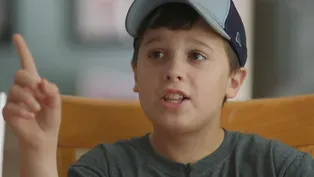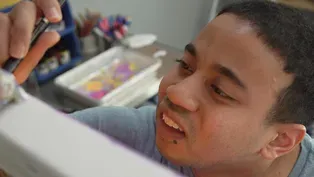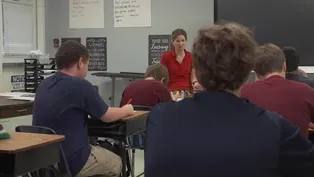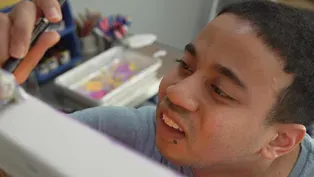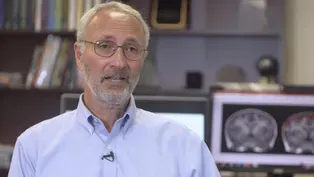NC Channel
Autism: Life on the Spectrum
Special | 26m 46sVideo has Closed Captions
April is Autism Acceptance Month. Meet artists, teachers & others living on the spectrum.
An estimated 1 in 58 North Carolinians live on the Autism Spectrum. During Autism Acceptance Month, join us as we meet artists, teachers, and others on the Spectrum, and learn about the work being done to eliminate stigma and demystify the science that surrounds this neural disorder.
Problems with Closed Captions? Closed Captioning Feedback
Problems with Closed Captions? Closed Captioning Feedback
NC Channel is a local public television program presented by PBS NC
You are truly the public in public television and we need your support now more than ever.
NC Channel
Autism: Life on the Spectrum
Special | 26m 46sVideo has Closed Captions
An estimated 1 in 58 North Carolinians live on the Autism Spectrum. During Autism Acceptance Month, join us as we meet artists, teachers, and others on the Spectrum, and learn about the work being done to eliminate stigma and demystify the science that surrounds this neural disorder.
Problems with Closed Captions? Closed Captioning Feedback
How to Watch NC Channel
NC Channel is available to stream on pbs.org and the free PBS App, available on iPhone, Apple TV, Android TV, Android smartphones, Amazon Fire TV, Amazon Fire Tablet, Roku, Samsung Smart TV, and Vizio.
Providing Support for PBS.org
Learn Moreabout PBS online sponsorship- I can't walk into a room and be like, "Y'all stop.
I have autism."
- [David] How a teacher with autism connects with her students on the spectrum while helping them navigate the world around them.
- [Yuko] He said, one day I'll be a painter.
- [David] And how a Raleigh man who has difficulty speaking has found his voice through art.
[calm droning music] ♪ Welcome to Life on the Spectrum.
I'm David Hurst.
April is Autism Acceptance Month and people across the state are raising awareness, promoting acceptance, and sparking change.
There are many types of autism, which is why it's called the spectrum.
Joshua Isgett shows us what is autism and what it looks like in everyday life.
- [Joshua] First from 1885 to 1889 and then 1889 to 1893 was Benjamin Harrison but then 1893 to 1897 was Grover Cleveland's second term.
But on his second term, that's when his voice was recorded.
Not his first term.
I'm homeschooled here, it's called Highland Classical Academy.
Right now I'm on summer break.
I will start at the beginning of August.
- Let's see, if you were reading about... - [Joshua] Paul Revere?
- Paul Revere, and you were going to be doing like a keyword outline for it.
What would you start to do?
- Oh, a keyword outline?
- [Erin] He gets to kind of learn at his own pace.
Areas where he needs more time, we can take more time.
Areas where he's picking things up really quickly, we can just kind of move ahead.
He doesn't have to wait.
- Autism is a way your brain is wired and it can make you act a little different and also make you think a little different and also make you feel a little different in your emotions.
It makes you a little different from other people.
[calm droning music] - [Erin] Little things I guess that for him that I thought were just him being super bright.
When he was 18 months old, he knew his alphabet and he could tell you, by the time he was two, he could look at any car on the road and tell you, "That's a Honda Civic."
"That's a Toyota Camry."
You know, little things and I was just like, Oh he's just super bright, which he is.
We just didn't realize some of the things that would be a little bit more difficult for him until he got a little bit older.
[calm droning music] - Sometimes I just read it a few times and then my brain just remembers it.
And then like whenever I recite it, I recite the whole thing.
- We contacted TEACCH over at UNC and went in and he definitely qualified for a diagnosis.
- Right there is this Nintendo Entertainment System.
It's one of the old classy game systems from the eighties.
- [Erin] He's just a happy, quick learner.
He loves being around other people.
Kind of all the things that you would want in a kid, he's got them.
Now he will tell you that his sisters drive him crazy.
- [Joshua] Yeah.
All the time.
- And other things as well.
So everything's not perfect, but he's a great, great kid.
Like Joshua said, autism is just a different way of having your brain wired.
It doesn't make you any better or any less than anyone else.
Just means things are a little bit different, right?
- [Joshua] You're the same as other kids or adults.
Just try and find a way to be yourself.
- [Erin] That's right.
- Some people with autism have greater challenges than others.
One category on the spectrum is called non-verbal autism but King Godwin shows us it hasn't stopped him from finding unique ways to express himself.
- [Yuko] But you're telling me, what is the title of the painting, to the camera.
- Fish is having a good day because it's with a leaf.
- [Yuko] He said, "One day I'll be a painter."
So I said, "Okay, I've never seen you paint really much."
- It's purple.
- Purple, 99 is purple.
Okay.
And you like... Just because we think non-verbal doesn't necessarily means that he doesn't have a very powerful message.
And it's up to us to be able to hear what that message is and be able to communicate with him.
- Just like when you hear really good music, you know there's a lot of music theory behind it but you don't know it.
If you're not into music, you don't really know it, but you feel it.
So the same thing, when you see it his art.
Sometimes people just come up.
They couldn't explain it, but they love it.
So I think that's awesome.
- Well, most of the autistic person has very difficult time articulate their feelings.
And I think this was a token that he knew that he could express himself through art.
- It's having a fun day.
- [Thomas] If we think about one of his pieces of artwork, a bad day is probably red.
Probably going to be the number seven zero seven.
So many times he may not say a lot of words but the words that he uses and chooses to say are very profound, very powerful.
- I would think that you will never know what is the disabled can do for abled.
How do I say?
- Yeah, that's great, yeah.
- Could you help me out with the words?
- I guess the -- - You gotta find you know, what they can... - I would say just, you know allow your child or your person to thrive with what they have passion with and don't limit them just because we think that they don't have an ability or they have a disability.
They are overlooking the ability.
[calm droning music] - And with me now to continue the conversation is David Laxton with the Autism Society of North Carolina.
David, thanks for joining us today.
- Thank you so much for the opportunity to share with your viewers.
- So let's first take a step back and define for our viewers, what is autism?
- Well autism is a brain disorder.
It mainly impacts the areas of social interaction, communication, and folks on the autism spectrum may have restricted or repetitive behaviors.
It impacts currently, from the CDC, about one out of every 54 children born.
And that means that within our country, there's about 5.4, 5.5 million folks that are impacted.
And in North Carolina, we know from our organization that we reach over 40,000 families annually but there are more than that across North Carolina.
- You had mentioned the idea about an autism spectrum.
Could you define for us what that means?
- Well, yes.
And just like with the piece that you just showed, there are some individuals that may have limited verbal ability.
It's really a spectrum.
You may have somebody that has an extremely large vocabulary and their challenge is not so much being able to to communicate, but knowing the rules of communication.
So autism, it does impact communication more than anything but also with it being a disorder of the brain, it can impact the way that one processes information.
So some people may not know how to form the words and to communicate using verbal language.
They might use a different system such as an object system or some sort of picture exchange communication system.
But then there are other folks that are very verbal but because it's hard to know how to limit conversation or to understand the rules of interacting, that's where their challenges come up.
So each person is unique.
Each person is different from each other.
And that's one of the big misconceptions about the autism spectrum is that everybody is just like everybody else.
They're just like you and me.
We're different.
You have a full head of hair.
I don't.
[chuckling] You know, we have different interests.
We have different skills, different abilities.
But those are the things that we try to encourage people to remember particularly during this month is that each person is unique and each person has wonderful gifts to bring to the table.
- And speaking of misconceptions, what are some of the other misconceptions or stigmas out there about autism?
- Well, one of the big things is that, you know folks don't have the ability to lead a fulfilling life.
One of the things that we want people to realize during autism awareness and acceptance month is that you can include folks with autism and their families and the activities that we all enjoy.
Someone may not be able to express their interests verbally but you can certainly learn from them still by observing, seeing what makes them smile, seeing what they might be interested in.
And you might learn something by engaging with a new way of interacting with someone.
The other thing is that folks with autism do want to be able to get out and have a full life.
They wanna be able to work.
They wanna live independently.
They wanna have the same opportunities that the rest of us do.
And we also encourage folks like employers, other community groups, to look at involving folks with autism and their families in your activities.
- What work do you think still needs to be done to continue to help raise awareness and acceptance about autism?
- Well, the acceptance part, I think we're starting to make progress on but then there's still so much more to do.
The rate of unemployment for adults on the autism spectrum is much higher than the normal rate of employment.
We need folks to be open to providing volunteer opportunities and opportunities to employ adults with autism.
We need the community to realize that whenever you're planning events, you might factor in some sensory friendly components for it because that's gonna make your event open to a new audience of those with autism and their families.
Again, the main thing is just being open to learning a little bit more.
Listen to your neighbors, your coworkers, your friends that might have a loved one with autism because you know, with it being one in 54, if you think about a classroom in North Carolina.
that means there's a kid with autism in every other classroom.
So autism is not a matter of if you know somebody, it's a matter of how many people that you know and how you connect them with the resources and the supports that can help them.
- And you briefly mentioned employment challenges.
What are some of the other key challenges that people with autism face?
- Well, right now there's a bill that's at the North Carolina legislature that the Senate and the House are considering that can expand some of the support services that are available to families.
It's considered to be funding additional innovations, waiver slots.
That's one thing that can get people to work with somebody in their home, in the community.
It can do a lot of good.
So there's things on a legislative standpoint that can help, there's things within the school system that can help.
Again, folks can visit our website to learn more about the different initiatives and about autism so that they can be better informed and understand the issues that are facing our community.
But right now from a policy standpoint, we're hoping that we can build that foundation by having more waiver slots that'll help kids.
And then whenever they become adults they're better prepared to enter the workplace or continue on with their education or just live independently in their community.
- Now, this COVID-19 pandemic has pretty much touched every area of our lives.
How has it complicated things for children with autism and their families?
- Well, individuals on the autism spectrum, we mentioned at the beginning of our interview that they might have restrictive or repetitive behaviors and routine is a really important part of life.
So as you can imagine, this has been a big disruptor in routine.
You're not going to the same classroom.
You may not have the same way of being able to get your education if you're a student.
Also, if you're an adult, your workplace may have changed it's hours.
You may not be able to work remotely.
So it's been a big challenge for everybody, just figuring out how we can continue to deliver the services and the supports that are needed but also keep people in their jobs, keep people engaged, and you know, even though they may not communicate in the same way, we still need to connect with each other to maintain positive mental health and have those interactions that we all rely on so that we can have connections.
We can get outside, we can get some exercise we can just stay healthy.
And now that we're kind of nearing a point where we might see a light at the end of the tunnel, we're really ramping up, trying to get people back to their jobs, trying to make sure families know what they need to be communicating with their educators about if their students are transitioning back into the classroom.
So it's been disruptive but hopefully everybody is laying that foundation for a smooth transition back into our new normal.
- And David, before you go wanna give you a chance to plug your organization.
What is the Autism Society of North Carolina?
And what is it about your work that's making a difference?
- Well, our mission is to improve the lives of individuals with autism, support their families and educate communities.
And we've been doing that for over 50 years.
We're a statewide organization that serves all 100 counties.
And regardless of where you happen to be on the lifespan how young old you are, whether you're a family member or a teacher, what have you, we're here to help.
We have information.
We have workshops.
We have people that can come and connect with you.
We even do tele-health now as a result of COVID.
So we encourage people to learn more about autism, learn more about the resources available, and you can do that through our website at autismsociety-nc.org.
- David, thanks for your time.
We appreciate you helping raise awareness about this important topic.
- Thank you so much for the opportunity.
We really appreciate it.
- There is some uncertainty about what causes autism, and experts say it's a complicated topic.
We talked to a leading researcher who explains the science behind autism.
[calm droning music] - So we define autism as a behavioral syndrome, which means it's a co-occurrence of certain behavioral phenomena.
There are two key phenomenon.
One are certain kinds of social deficits.
Deficits in regards to social interaction.
And the other domain is a little bit of a messier umbrella term.
We use the term ritualistic repetitive behaviors.
[calm droning music] Autism is defined by behaviors only.
So it's very different from diabetes that we have a very specific biological test about insulin levels, or a sickle cell that we know is due to a single gene.
And as a result, it's a bit of a hodgepodge, frankly.
[calm droning music] It's defined clinically on the basis of these behaviors because currently that's what we treat.
But what we've learned over the last 10 or 15 years particularly from genetics is that there are multiple autisms.
We have some people with autism that have intellectual disability.
What used to be termed mental retardation.
We have some that have high IQ's.
We have some that have more severe ritualistic and repetitive behaviors, and some that have milder ritualistic and repetitive behaviors.
As we sort of look under the hood, when we look at the brain or we look at genetics, based on defining people as having autism, we find a bunch of different stuff, and that's essentially a problem in our field because we find too much.
- Teaching can be a difficult profession, even for those who have been in the classroom for many years.
One teacher we spoke with is in a unique position to do what she does.
[calm droning music] - [Mary] It is a school designed to provide the regular school curriculum to students on the autism spectrum.
It's really strange, it was actually when I was in grad school.
I had all these autistic behaviors and no one picked up on it.
And then I was reading about it because it relates to emotional behavioral disorders.
I was reading about it and there are so many things I was reading about that made me shudder because it felt so familiar to me.
A lot of mix of feelings, like one was kind of like that denial, but academic, like curious, like what?
[calm droning music] Isn't there a story where he tricks someone to marry him?
Like a really beautiful goddess?
- [Student] Yeah, he gets married to Aphrodite.
- I heard that on a Neil Gaiman story.
Well, I've been teaching for a long time.
So there's that.
I actually have had an easier time teaching a group of students with same disability as I because we almost have a mind lock like we're the Borg of Star Trek.
Now I'm showing my geekiness.
That's very common.
[students chattering] We actually have this thing at the school called follow the group plan, which is if a child is doing a behavior which doesn't fit the class, we say follow the group plan.
And we call it on a class as much as a group.
And the purpose is to teach the child to move toward independence and be able to work in a team so they can have successful employments.
Neurotypicals or non autistics should not have to feel like you have to walk on eggshells.
It's a time and age now where a lot of people are coming out with all sorts of things about themselves.
Like I have anxiety, I have depression.
I'm LGBT, I'm this, I'm that.
And trying to figure it out and trying to say you should accommodate me for this, but you know what?
Like everybody's got something.
Or should it be like a monster of plastic surgery disasters.
I, like everybody, wanna have a job and have meaningful life.
And I can't walk into a room and be like, "Y'all stop.
I have autism."
I really believe that humans are social beings and they naturally want other people.
And that's why I believe so many people with autism are depressed and anxious because we're not getting that social interaction.
We don't know how, we really want to.
I just have to do it, get over the shyness and to know when to interject or just be around people because it's such a huge thing.
[calm droning music] - Such a cool story.
Joining us to continue the conversation is Laura Klinger, director of the UNC TEACCH autism program.
Laura, thanks for joining us today.
- You're welcome.
It's nice to be here.
- So can you first explain to our viewers what is the TEACCH autism program?
- Sure.
The TEACCH autism program is part of UNC Chapel Hill School of Medicine.
And we were really one of the very first if not the first statewide autism program in the country.
So we were established by the state of North Carolina in 1972 to provide services for individuals with autism and their families across the lifespan.
So all these years later in 2021, we have seven outpatient clinics around the state.
We have an employment services program, both in the triad and in the triangle areas of the state.
We have a residential program for adults with autism in Pittsboro.
And then we have a international training program where we train educators and clinicians on how to support individuals with autism.
And we also have a research program specializing in transition to adulthood and adult services.
- And I'm sure we'll talk about that in just a little bit but along with being the director of the TEACCH program, you also helped develop Julia, a Muppet with autism to the cast of Sesame Street.
What's the importance of introducing the idea of autism into the mainstream, into a show like Sesame Street?
- Yeah, I thought that was a fabulous opportunity to be part of the team that worked on Julia.
I have just the utmost respect for the way that Sesame workshop worked to make sure they brought in experts in the field, both clinicians, researchers, and autistic adults themselves.
I think the idea behind Julia is that people with autism are our friends and our neighbors, our colleagues, our students next to us in classrooms.
And Julia was designed to bring a level of awareness and acceptance of autism to the community.
I think we used to think that autism was a rare disorder, but it's not.
The research done by the Center for Disease Control says that one in every 54 eight year old children has a diagnosis of autism.
So I think the idea behind Julia is to bring that recognition and acceptance to the broader community.
- And with children, research shows that early intervention is important.
What are some of the indications or signs that families can look out for?
- Yeah, that's great question.
We know that the earlier the intervention, the better the outcomes in terms of students being able to be in general education classrooms and having good intellectual and learning skills.
So it's important to recognize those symptoms earlier.
The very first symptoms of autism are typically present around 12 months of age.
And around 12 months of age we see that children who have a diagnosis of autism don't share their enjoyment with other people.
So at 12 months, children should be looking at other people's faces.
They should be pointing to show that they're excited about a truck or a bird or the moon.
They should be following their parents' points and following their parents' gaze to kind of share those interests.
And yet we know that children who go on to develop autism don't typically have that level of shared social enjoyment.
Unfortunately, the average age of diagnosis of autism in the United States is around four years of age.
And so there's this gap between when we know those symptoms are present at 12 months and yet it takes three years on average before a child gets a diagnosis.
So that's something that we're working on here at UNC Chapel Hill, both in the TEACCH program, but also in allied health sciences and Carolina Institute for Developmental Disabilities, all working to help early interventionists and families and physicians recognize those symptoms and get children an earlier diagnosis.
- We heard in that story from Ms. Janca, she sounds like an incredible teacher.
What are some of the key strategies for training teachers to effectively teach individuals on the autism spectrum?
- Yeah, I thought that just was a fabulous story to hear her perspective on her own experiences.
And then also working with her students.
We think about autism as being a type of learning disability, where there are specific kinds of learning differences that children with autism experience.
So for example, children with autism often aren't focusing their attention on the things that teachers might want them to focus their attention on.
Or children with autism might have difficulty during transitions.
Even if it's time to go to a preferred activity, maybe it's time to go to lunch or to go out to the recess where a lot of children would typically be excited.
We find that those kinds of transitions are difficult for children with autism.
So here at TEACCH, our educator programs are really designed to help educators understand those learning differences associated with autism so that they can better support their students in learning around the world, or about the world around them.
I think you also heard from her that there are some social challenges that our students with autism experience and it's wonderful when teachers can support those children to know how to interact with the other children and create some pure buddy systems where children can learn to be friends.
Here at UNC, we have resources for educators, both at TEACCH and we also have education resources through our Frank Porter Graham Child Development Institute.
So we have a lot of resources for educators here at UNC and how to best support those students with autism.
- And pivoting to adults with autism.
You alluded to earlier and employment program.
We know that adults with autism face a set of difficulties that could affect employment.
Can you share with our viewers a little bit more about that program?
- Yes, I'd be happy to.
I think I'm very proud of our program and our employment services group.
Nationally, adults with autism are successfully employed about 38% of the time.
About 38% of adults with autism are employed.
But in our program here at TEACCH, we're successful 84% of the time at helping adults with autism find and maintain meaningful employment services.
In the last few years, we've really worked to develop transition to adulthood services for those individuals leaving high school and entering the world of adulthood.
So we have a program in collaboration with the North Carolina community college system.
We're working with six community colleges for adolescents and young adults to attend our transition to adulthood program.
And that gives our students an opportunity to learn about college, but also to be prepared for the world of employment.
And that's a great collaboration, both with the college system and also with North Carolina vocational rehabilitation.
- Sounds like a lot of great work going on.
Laura, thank you for your time and for your insight on this important topic.
- Thank you very much for having me today.
- For more information, visit autismsociety.org.
I'm David Hurst.
Thanks for watching.
♪ - Quality public television is made possible through the financial contributions of viewers like you, who invite you to join them in supporting PBS NC.
Video has Closed Captions
Clip: Special | 2m 37s | Joshua Isgett shows us what Autism looks like in everyday life. (2m 37s)
King Godwin Speaks through his Art
Video has Closed Captions
Clip: Special | 2m 17s | King Godwin is nearly nonverbal and speaks through his art. (2m 17s)
Mary Janca has Autism and Teaches in Greensboro
Video has Closed Captions
Clip: Special | 2m 48s | Mary Janca has Autism and teaches at Lionheart Academy of the Triad. (2m 48s)
Preview | Autism: Life on the Spectrum
Preview: Special | 20s | Meet artists and teachers and others living everyday on the spectrum. (20s)
Video has Closed Captions
Clip: Special | 1m 58s | Dr. Joseph Piven explains Autism Spectrum Disorder (ASD). (1m 58s)
Providing Support for PBS.org
Learn Moreabout PBS online sponsorshipSupport for PBS provided by:
NC Channel is a local public television program presented by PBS NC
You are truly the public in public television and we need your support now more than ever.
